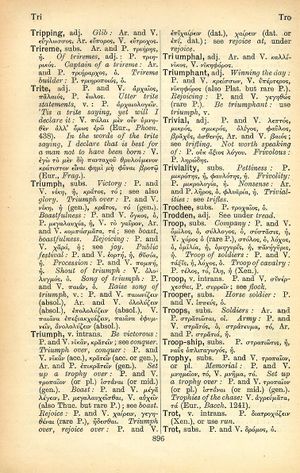trite
From LSJ
Ὁ θάνατος οὐθὲν πρὸς ἡμᾶς, ἐπειδήπερ ὅταν μὲν ἡμεῖς ὦμεν, ὁ θάνατος οὐ πάρεστιν, ὅταν δὲ ὁ θάνατος παρῇ, τόθ' ἡμεῖς οὐκ ἐσμέν. → Death is nothing to us, since when we are, death has not come, and when death has come, we are not.
English > Greek (Woodhouse)
adj.
P. and V. ἀρχαῖος, παλαιός, P. ἕωλος.
Utter trite statements, v.: P. ἀρχαιολογεῖν.
'Tis a trite saying, yet will I declare it: V. πάλαι μὲν οὖν ὑμνηθὲν ἀλλʼ ὅμως ἐρῶ (Eur., Phoen. 438).
In the words of the trite saying, I declare that is best for a man not to have been born: V. ἐγὼ τὸ μὲν δὴ πανταχοῦ θρυλούμενον κράτιστον εἶναι φημὶ μὴ φῦναι βροτῷ (Eur., Frag.).
Latin > English (Lewis & Short)
trĭtē: ēs, f., = τρίτη; in music,
I the third string or tone in the musical scale, Vitr. 5, 4.

